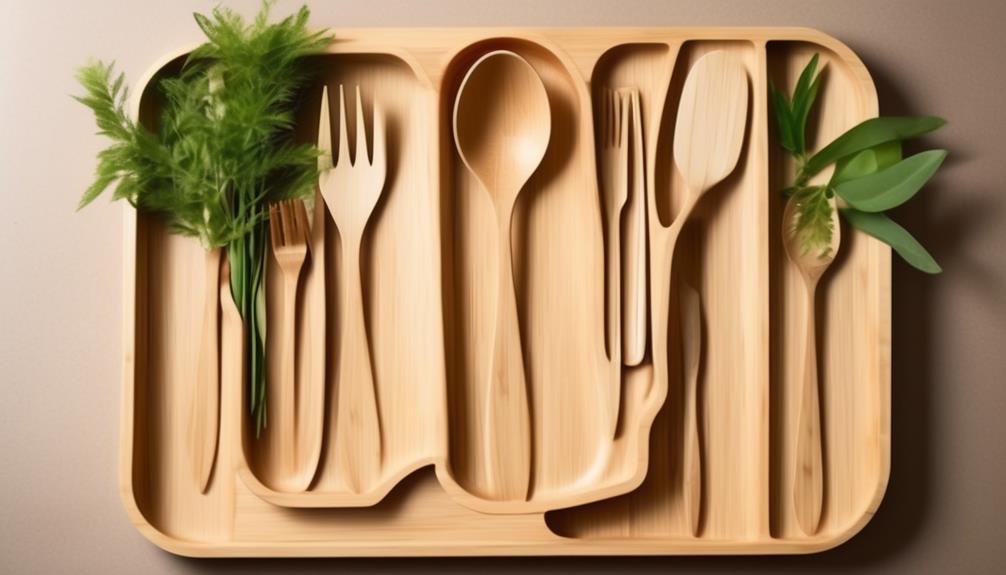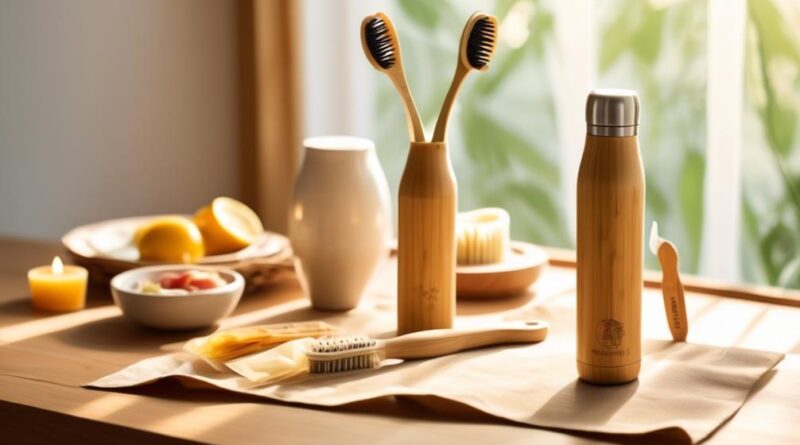3 Best Eco-Friendly Alternatives to Plastic Products
Looking to reduce your plastic usage while still maintaining a sustainable lifestyle? Look no further.
There are three eco-friendly alternatives to plastic products that are not only better for the environment but also for your overall well-being.
These alternatives provide a great way to make a positive impact on the planet without sacrificing convenience or quality.
Bamboo Toothbrushes
Consider switching to a bamboo toothbrush as an eco-friendly alternative to plastic toothbrushes. These toothbrushes are made from sustainable materials, specifically bamboo, which is a fast-growing and renewable resource. Unlike plastic toothbrushes that take hundreds of years to decompose, bamboo toothbrushes are biodegradable, reducing their environmental impact. By making the switch, you can actively contribute to reducing plastic pollution in landfills and oceans.
The handle of a bamboo toothbrush is crafted from sustainable bamboo, a material that can be replenished quickly, unlike the oil-based plastic used in traditional toothbrushes. Bamboo is also naturally antimicrobial, making it an excellent choice for oral hygiene products. The bristles are typically made from nylon-6, a type of plastic, but some manufacturers offer options with biodegradable bristles made from castor bean oil or other natural materials. While these bristles may still need to be removed before composting, they're a step forward in reducing the overall environmental impact of toothbrushes.
When it's time to replace your toothbrush, simply remove the bristles and compost the bamboo handle. This simple act reduces the amount of plastic waste in the environment and contributes to a more sustainable lifestyle. Making the switch to a bamboo toothbrush not only benefits the environment but also promotes the use of sustainable materials in everyday products.
Stainless Steel Straws
Switching to stainless steel straws presents another eco-friendly alternative to plastic products. The manufacturing process of stainless steel straws involves the use of durable and long-lasting materials. Unlike plastic straws that are produced from non-renewable resources and contribute to pollution, stainless steel straws are made from stainless steel, a material that can be recycled and reused. This manufacturing process significantly reduces the environmental impact compared to plastic straw production.
In terms of environmental impact, stainless steel straws offer a sustainable solution to the issues caused by single-use plastic straws. The durability and reusability of stainless steel straws make them a long-term investment that reduces the amount of waste generated from single-use plastic straws. Additionally, the production of stainless steel straws generates less waste and pollution compared to plastic straw production, as stainless steel is a highly recyclable material.
Beeswax Food Wraps
Looking for a sustainable alternative to plastic wrap? Beeswax food wraps offer a reusable and eco-friendly option for preserving your food. These wraps are made from cotton infused with beeswax, tree resin, and jojoba oil, making them a sustainable choice. Beeswax sustainability is a key factor in reducing the environmental impact of single-use plastics.
The materials used in beeswax wraps are biodegradable, and the production process has a relatively low carbon footprint compared to plastic wrap manufacturing.
In terms of effectiveness and usability, beeswax food wraps are versatile and can be molded to fit various shapes and sizes, providing a secure seal around your food. The natural antibacterial properties of beeswax help keep food fresh, and the wraps are breathable, allowing food to last longer. They're an excellent choice for wrapping cheese, fruits, vegetables, bread, and covering bowls or containers.
When cared for properly, beeswax wraps can last for up to a year, reducing the need for single-use plastic wraps and contributing to less waste in landfills.
Glass Containers
Glass containers provide a durable and reusable alternative to plastic storage options, offering a sustainable solution for storing and preserving food. When it comes to sustainable packaging, glass containers are an excellent choice due to their minimal environmental impact.
Unlike single-use plastics, glass containers are designed for long-term use, reducing the need for constant replacement and minimizing waste. Their durability ensures that they can be reused multiple times, making them a cost-effective and eco-friendly option for your kitchen.
The environmental impact of glass containers is significantly lower than that of plastic. Unlike plastic, which can release harmful chemicals into food and the environment, glass is non-toxic and inert, ensuring that no harmful substances leach into your food. Additionally, glass is 100% recyclable, meaning it can be repurposed into new containers endlessly without any loss of quality or purity.
This recycling process further reduces the consumption of raw materials and energy, contributing to a more sustainable and environmentally friendly lifestyle.
Silicone Food Storage Bags
When considering eco-friendly alternatives to plastic storage options, silicone food storage bags offer a versatile and sustainable solution for your kitchen needs. These bags are designed with eco-friendly durability in mind, providing a long-lasting alternative to single-use plastic bags. The use of silicone material ensures that the bags can be reused countless times, reducing the environmental impact of disposable plastic bags.
Silicone food storage bags are an excellent option for sustainable food preservation. Their airtight seal helps keep food fresh for longer periods, reducing the need for single-use plastic wrap or containers. You can confidently store a variety of foods, including liquids and solids, without the risk of leakage or contamination. Whether you're storing leftovers, meal prepping, or packing snacks for on-the-go, silicone food storage bags offer a reliable and eco-friendly solution.
Furthermore, the durability of silicone food storage bags means that they can withstand both hot and cold temperatures, making them suitable for storing food in the freezer, refrigerator, or even for sous vide cooking. This versatility allows you to seamlessly integrate these bags into your daily cooking and meal storage routines.
Hemp or Cotton Produce Bags
Consider opting for hemp or cotton produce bags as a sustainable and reusable alternative to single-use plastic bags when shopping for fruits and vegetables. These eco-friendly bags not only help reduce plastic waste but also offer several other benefits.
- *Environmental Impact*: Hemp and cotton are natural and biodegradable materials, making them an environmentally friendly choice. By using hemp or cotton produce bags, you can significantly reduce the amount of plastic waste that ends up in landfills or oceans, helping to protect the planet.
- *Durability and Strength*: Hemp and cotton produce bags are durable and strong, capable of holding a variety of fruits and vegetables without tearing or stretching. Unlike single-use plastic bags, which often end up being thrown away after a single use, hemp and cotton bags can be reused multiple times, making them a more sustainable option.
- *Versatility*: These bags aren't just for produce. They can also be used for storing other items, such as bulk grains, nuts, or even non-food items like toys or accessories. This versatility makes them a practical and multipurpose choice for anyone looking to reduce their environmental impact.
Wooden Compostable Cutlery

Choosing wooden compostable cutlery offers a sustainable and biodegradable alternative to traditional plastic utensils, reducing environmental impact while providing practical functionality for various events and occasions. By using wooden compostable cutlery, you're supporting sustainable forestry practices, which help maintain the health of forests for future generations. These utensils are made from renewable resources, such as bamboo or birch, that can be replenished naturally. This means that the production of wooden compostable cutlery has a significantly lower environmental impact compared to plastic utensils, which contribute to pollution and resource depletion.
In addition to being environmentally friendly, wooden compostable cutlery is also practical for single-use purposes at events like picnics, parties, and takeaway food outlets. Once you have used the cutlery, it can be easily disposed of in compost bins, where it will naturally decompose without leaving behind harmful microplastics or toxic residues. This aligns with the growing trend of reducing single-use plastic waste and transitioning towards more sustainable, circular waste management practices.
When selecting wooden compostable cutlery, it's important to look for products certified by reputable organizations that ensure sustainable forestry practices. This ensures that the wood used in the production of the cutlery is sourced responsibly and doesn't contribute to deforestation or habitat destruction. By making the switch to wooden compostable cutlery, you're making a positive impact on the environment while still enjoying the convenience of disposable utensils.
Metal Water Bottles
Metal water bottles offer a durable and reusable alternative to single-use plastic bottles, promoting sustainability and reducing waste. When considering metal water bottles as an eco-friendly alternative, there are a few key points to keep in mind:
- Insulation Benefits: Unlike plastic bottles, metal water bottles often come with double-wall insulation, keeping your drinks cold for up to 24 hours or hot for up to 12 hours. This feature not only reduces the need for single-use plastic bottles but also encourages the use of these bottles for various types of beverages, ultimately leading to a decrease in overall plastic waste.
- Durability Comparison: When comparing metal water bottles to their plastic counterparts, the durability of metal bottles is unmatched. They're resistant to dents, scratches, and breakage, making them a long-lasting and sustainable option. By investing in a metal water bottle, you can significantly reduce the number of plastic bottles that end up in landfills or oceans.
- Environmentally Friendly Materials: Many metal water bottles are made from stainless steel, a material that isn't only durable but also recyclable. By choosing a metal water bottle, you aren't only reducing plastic waste but also opting for a product that can be recycled at the end of its life, further minimizing its environmental impact.
Considering these factors, it's clear that metal water bottles are a practical and sustainable choice for daily hydration needs. Making the switch to a metal water bottle not only benefits the environment but also ensures that you have a reliable and long-lasting container for your beverages.
Frequently Asked Questions
Are There Any Specific Guidelines for Disposing of Bamboo Toothbrushes and Wooden Compostable Cutlery?
When disposing of bamboo toothbrushes and wooden compostable cutlery, follow sustainability guidelines. Consider composting wooden products and recycling the bamboo. It's important to maintain eco-friendly habits for a greener environment.
How Do Silicone Food Storage Bags Compare to Traditional Plastic Bags in Terms of Durability and Longevity?
When comparing silicone food storage bags to traditional plastic bags, silicone bags are more durable and have a longer lifespan. They are great alternatives to plastic bags, offering a sustainable and eco-friendly option for your food storage needs.
Can Glass Containers Be Used in the Microwave and Freezer Without Any Risk of Damage?
Yes, glass containers are safe for microwave use, but be cautious with sudden temperature changes. When using in the freezer, leave some room for expansion. Always check for microwave and freezer safety labels on the containers.
What Are the Differences in Environmental Impact Between Hemp and Cotton Produce Bags?
When comparing hemp vs. cotton, sustainability is key. Hemp is more eco-friendly than cotton due to its lower water and pesticide requirements. Hemp bags have a smaller environmental impact and are a better choice for reducing plastic use.
Are There Any Special Care Instructions for Maintaining the Quality of Metal Water Bottles?
To keep your metal water bottle in top shape, follow these cleaning tips and rust prevention methods. Rinse it regularly with warm, soapy water and dry it thoroughly to prevent rust. Avoid using abrasive cleaners.
Conclusion
So next time you're looking to make a more eco-friendly choice, consider swapping out your plastic products for sustainable alternatives like bamboo toothbrushes, stainless steel straws, and beeswax food wraps.
With these simple changes, you can reduce your plastic waste and help protect the environment.
Small actions like these can add up to make a big difference in the fight against plastic pollution.
Make the switch today and be a part of the solution!
